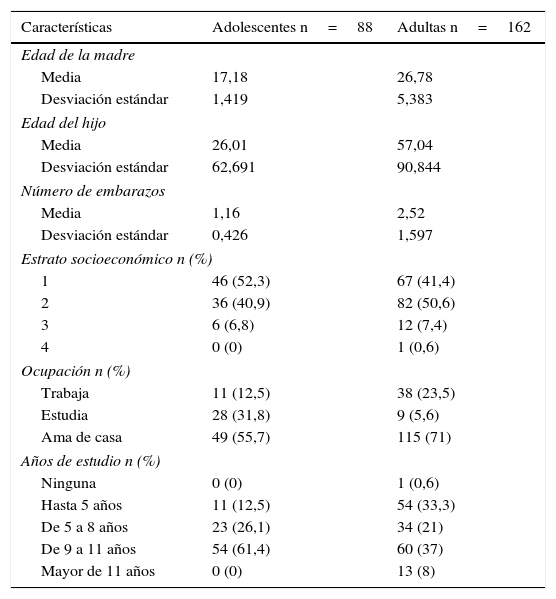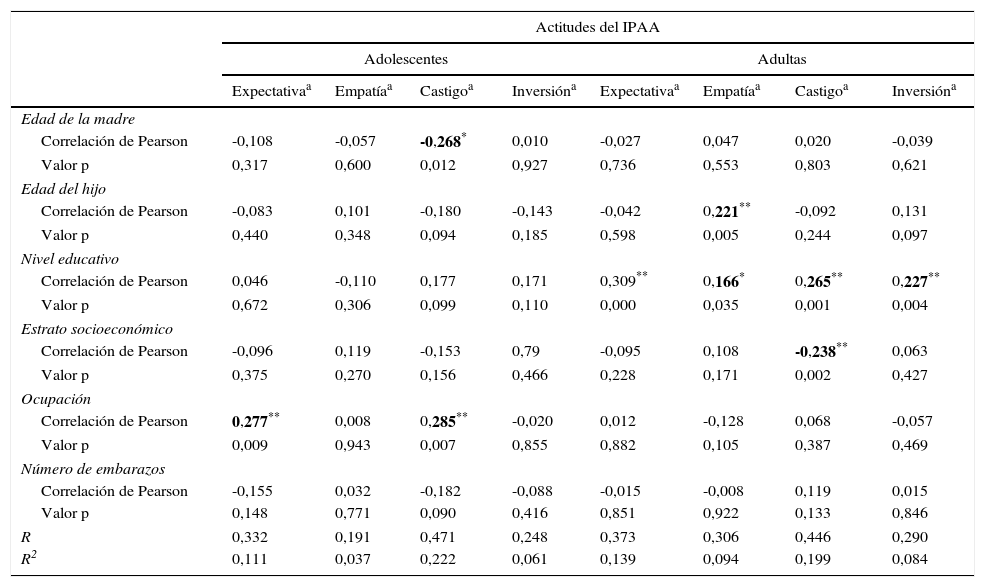Determinar los factores asociados al riesgo de negligencia en el cuidado del hijo durante el primer año de crianza en madres adolescentes y adultas.
MétodoEstudio de corte transversal correlacional, muestra no probabilística, conformada por 250 madres durante su primer año de crianza. La información se recolectó mediante el Inventario de Paternidad para Adultos y Adolescentes.
ResultadosParticiparon 88 madres adolescentes y 162 adultas. En general las dimensiones presentaron puntajes bajos tanto para el grupo de madres adolescentes como para el grupo de madres adultas, reflejando deficiencias en la conducta materna adecuada y riesgo de negligencia en el cuidado de los hijos. Se evidenció en el grupo de madres adolescentes una correlación significativa entre los factores: edad de la madre y ocupación con la dimensión creencia en el castigo y ocupación con la dimensión de expectativas inapropiadas. El grupo de madres adultas mostró correlación significativa entre: nivel educativo con las dimensiones de inversión del rol, creencia en el castigo y falta de empatía; estrato socioeconómico con la dimensión de creencia en el castigo y edad del hijo con la dimensión de falta de empatía.
ConclusionesLas expectativas de crianza de las madres muestran un alto riesgo de negligencia en el cuidado de sus hijos. Por lo tanto, enfermería debe promover el fortalecimiento del rol materno.
To determine the factors associated with the risk of negligence in child care during the first year of rearing in adolescent and adult mothers.
MethodThis was cross-sectional correlation study with a non-probabilistic sample composed of 250 mothers during their first year of child rearing. The information was collected through the Parenting Inventory for Teenagers and Adults.
Results88 teenager mothers and 162 adult mothers participated in this study. In general low scores were found in all dimensions in both adolescent mothers group and adult mother group, which indicate the existence of deficiencies in the adequate maternal behavior and risk of negligent care to their children. In the group of teenage mothers there was an evident and significant correlation between the factors: maternal age and occupation dimension belief in punishment and occupation with inappropriate expectations dimension. The group of adult mothers showed significant correlation between: educational level with the dimensions of role reversal, belief in punishment and lack of empathy; socioeconomic dimension with the belief in punishment and age of the child with the lack of empathy dimension.
ConclusionsChild rearing expectations of mothers show a high risk of negligence in child care. Therefore, nurses should promote the strengthening of the maternal role.
Artículo
Comprando el artículo el PDF del mismo podrá ser descargado
Precio 19,34 €
Comprar ahora










